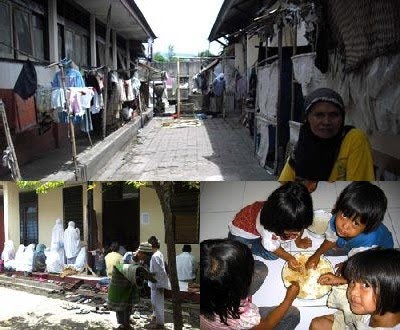The National Commission on Violence Against Women (Komnas Perempuan) has urged the central government and the West Nusa Tenggara (NTB) provincial administration to begin the resolution of humanitarian issues faced by hundreds of Ahmadiyah refugees in Mataram.
Currently, 34 families, consisting of 138 Ahmadis, live at the Wisma Transito shelter in Mataram. They have been displaced since February 2006, after being forcefully evicted from their homes in Ketapang hamlet, Gegerung village, Lingsar district, West Lombok.
This lengthy period spent in refuge is deemed a basic human rights violation, especially for female refugees at the shelter.
Komnas Perempuan has highlighted the Ahmadiyah issue as a case of violence against women.
"The Ahmadiyah issue in Mataram should not be allowed to continue. The government should make efforts to resolve it. We have brought the matter to the attention of the President, home minister, justice and human rights minister as well as the religious affairs minister [in an attempt] to settle the issue," Komnas Perempuan deputy chairwoman Masruchah told reporters on Thursday,
"We urge the President and relevant ministries to no longer declare Ahmadiyah as a cult. The refugee issue at the Wisma Transito shelter should be resolved because they are also Indonesian citizens — who have the same rights as others," she said after opening a seminar on women's issues at the Sangkareang governor's office.
According to Masruchah, the difference of religion and faith is not a problem. The problem has instead risen due to a particular assumption that has become the main problem and source of debate, including pressure from particular parties.
Hundreds of Ahmadis do not have access to citizenship rights, such as identity cards, which deprive them access to education and cheap healthcare, said Masruchah, based on observations made by Komnas Perempuan.
She expressed hope the West Nusa Tenggara provincial administration could play an active role
in resolving the domestic Ahmadiyah issue.
Apart from the Ahmadiyah issue, the number of cases of violence against women in Indonesia remains prevalent. Based on Komnas Perempuan data, around 119,107 cases of violence against women have been reported in 2011, with 258 of them in West Nusa Tenggara.
"We also found 16 policies within the provincial, municipal and regency administrations, which are discriminative against women. We are taking them to the home minister for review," she said.
She cited the dress code bylaw at the Dompu regency administration that requires female civil
servants to wear the hijab (headdress) while at work. The dress code issue is part of individual rights and the government or state cannot intervene.
"They say the reason behind the headdress policy is to prevent sexual harassment and rape, but not for us. Even this breaches women's rights," said Masruchah.


















